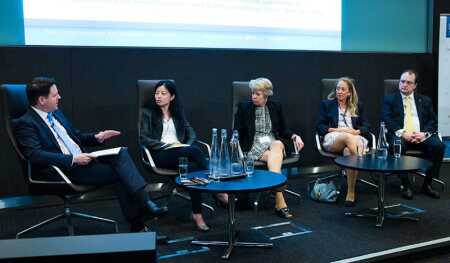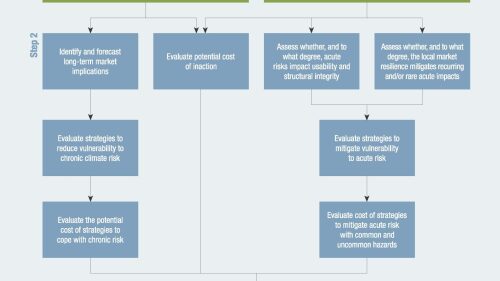
From left to right: moderator Eoin Bastible, managing director, UBS; Alicia Qin, director, Goldlit Direction; Anne Kavanagh, chief investment officer, PATRIZIA; Audrey Klein, managing director, Corestate Capital Partners UK; and Douglas Crawshaw, senior investment consultant, Willis Towers Watson, speaking at the ULI U.K. Conference in London.
London-based investors have been less active internationally in recent months for a variety of reasons, including where the global economy is in the business cycle and the implications of the Brexit vote, said panelists discussing capital market trends. at the ULI U.K. conference
“U.K. investors have been active in the U.K., but they have been focusing more on low-risk products than strategies than on more traditional opportunities,” said Douglas Crawshaw, senior investment consultant and head of Europe, Middle East, and Africa real estate manager research at Willis Towers Watson. “There was some nervousness after Brexit, but they have been active in the secure income end of the risk spectrum. They’ve also been active overseas. That has been growing year on year and as investors have been diversifying away from their domestic markets.”
Anne Kavanagh, chief investment officer at Patrizia, added that though the market is late in the cycle—and not just in the United Kingdom—the activity she is witnessing is markedly different from that before the 2007–2008 crash. “A lot of investors are nervous about the cycle, and there is a strong focus on sustainable income,” she said. “But there are a lot more dynamics in play than in the buildup to 2007. We’re seeing a hunt for yield and for stable incomes, and that will continue.”
The change in U.K. investor behavior can be explained in part by the fact that since the Brexit vote, the British pound has been in a weak position on the world stage, meaning foreign investors, notably from China and Hong Kong, have been buying because of favorable exchange rates.
However, Alicia Qin, director at Goldlit Direction, warned that recent Chinese government restrictions on outward capital flows will affect investment volumes, particularly in London.
“Last year, [China’s] government launched a policy to control capital flows, so there will be a period of adjustment in the London market,” she said. “It’s because of the debt issue. Generally, Chinese investors use debt from Chinese banks, and there is concern about the financial system.”
As a result, Qin predicted, not only will London see a lower volume of investment from China, it may also see a number of substantial sales from Chinese investors. “We will see some big sales, but it’s not permanent. It’s just a period of adjustment,” she said.
“The government wants investment to benefit Chinese economic development, and [foreign] real estate is one of five areas that aren’t seen as real assets by the government.” Investment originating in Hong Kong is an exception because of the different rules that apply there, she said.
Regarding U.S. investors, many pension funds have topped out their allocations for U.K. investments, said Audrey Klein, managing director and head of international institutional clients at Corestate Capital Partners. And where they still have allocations, they are looking for value-add investments, she added.
Asked by moderator Eoin Bastible, head of business development, EMEA, at UBS Asset Management, about political risk in Europe following a tumultuous couple of years, Kavanagh seized on the subject. “The outlook a few months ago was much more uncertain,” she said. “There are still uncertainties in terms of Italy and Spain, but some of the volatility we were expecting from the French and German elections [has gone away].
“We have to remember that the euro really is still in its infancy, so it won’t always be smooth,” she said. “But Europe is in a relatively good place compared to 18 months ago. For a large part of my career, we didn’t really pay attention to politics, but we do now. I think that will continue for the foreseeable future.”
Qin cited the current negotiations between China and the United States on trade and taxation. “With the U.S., there is always a negotiation,” she said. “So far, we don’t know what will be agreed, but the Chinese government is strong at the moment; it won’t sign anything that is bad for China’s economic development.”
Regarding sectors now attractive to investors, the panel agreed that logistics has experienced a massive revival in the past 18 months. “I think one of the things we’ve seen is that there has been a whole re-rating of the logistics sector,” Kavanagh said. “I’m not surprised, but I will be interested to see how it responds to driverless trucks in the next ten years.”
On retail, the panel agreed that the sector has some big questions to answer. “Retail hasn’t evolved as much as it should have,” Crawshaw said. “What are shopping centers for? Are they going to work as before, or are they just shop windows for displaying goods? There will be winners and losers. Where is a store located in the high street will become increasingly important as customers look for an experience and a reason to shop in person than on line? What else is available to consumers will determine the winners and losers – such as an experience that keeps the children happy? Shoppers are starting to need a reason to shop in person over the internet.”
Regarding multifamily housing—or build-to-rent, as it is commonly known in the United Kingdom—the panel said the potential is huge, but that hurdles remain before institutional investors move into the sector in a significant way. “We have been looking at it for a number of years,” said Crawshaw. “But our client’s have not yet invested in the sector in a big way.”
One reason is the sector’s reputation, at least until the professional management of build-to-rent strategies has matured and is well understood by the public, said Crawshaw. “History is an issue: we all have memories of what it’s like to rent,” he said. “We need to get the message out about professional management.”




